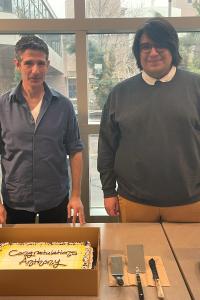 On Monday, April 1, 2024, Anthony Rojas Chávez successfully defended his Ph.D. thesis entitled, "Sequence-based prediction of virus phenotype, evolutionary potential, and selective pressures." In the accompanying photo, Anthony (right) is shown alongside his mentor, Hillel Haim, MD, PhD (left).
On Monday, April 1, 2024, Anthony Rojas Chávez successfully defended his Ph.D. thesis entitled, "Sequence-based prediction of virus phenotype, evolutionary potential, and selective pressures." In the accompanying photo, Anthony (right) is shown alongside his mentor, Hillel Haim, MD, PhD (left).
Research
The pandemics caused by HIV-1 and SARS-CoV-2 have led to advancements in treatments and vaccines. However, HIV-1 remains incurable and new SARS-CoV-2 variants challenge vaccine efficacy. The high mutation rates of these viruses contribute to their ongoing diversity, presenting clinical challenges that necessitate a deeper understanding of viral evolution. To address these challenges, we leveraged sequence information to investigate the evolutionary pressures applied on the virus, the potential for the emergence of mutations, and the effect of mutations on resistance to therapeutics.
We analyzed the historical changes in sequence of HIV-1 Env, focusing on the Fusion Peptide Proximal Region (FPPR). The observed profiles of change suggested that different positions of the FPPR are subjected to different selection pressures. Through extensive molecular tests, we showed that the FPPR regulates the structure of Env. Some sites increase virus fitness, but also enhance exposure of cryptic epitopes targeted by commonly-elicited antibodies. Our findings suggest that such common antibodies do not exert catastrophic population size reduction effects on new FPPR variants, but determine their set point frequencies in the population and historical patterns of change.
In addition, we explored how sequence information from early stages of the SARS-CoV-2 pandemic could predict the emergence of mutations in spike that were sampled within lineages such as Delta, Alpha, and Omicron.
While predicting future mutations may aid vaccine design, assessing their clinical impact is paramount. To address this, we developed a proof-of-concept sequence based model aimed at predicting whether a given HIV-1 envelope sequence will be resistant to an FDA approved drug. Our tool achieves high predictive performance at clinically relevant concentrations of the drug, offering the potential to expedite optimal clinical decisions regarding therapy regimens.
Our studies offer simple frameworks to understand protein evolution, predict mutation emergence, and facilitate therapeutic development and administration.
Background
Anthony was born in Lima, Peru, as the middle son of Felipe Rojas Marín and Ynes Chávez Cotrina. His early childhood was primarily spent in the nurturing environment of his grandparents' home in San Juan de Lurigancho.
In 2012, he obtained a scholarship through a government-sponsored program, which aimed to select the top 300 students from public schools and boarded them together in a school in the capital city to complete their high school education. This initiative opened numerous doors for him. He ultimately earned a full scholarship to finish his last two years of high school in Singapore, courtesy of the United World College program.
Upon graduating from high school in 2016, despite grappling with the challenges of learning English, he secured scholarships from the Shelby Davis Foundation and Colorado College (CC), enabling him to pursue his college education tuition-free. While at CC, he was forced to fulfill foreign language requirements, leading him to enroll in Beginner Russian courses. His enthusiasm for the language led him to enroll in two intermediate Russian classes in Moscow, Russia. While studying at the Maxim Gorky Literature Institute, he met with his future wife, Olga Zvereva.
While in CC he met his mentor, Dr. Phoebe Lostroh, who lit the fire behind his interest in microbiology. His work as an undergraduate focused on automating the study of the role of natural transformation in A. baylyi antibiotic resistance evolution using MEGA-plates. Immediately after graduating in 2019, he entered the Microbiology Graduate Program at the University of Iowa (UI).
While at UI, he worked under Dr. Hillel Haim, whose expertise in HIV-1 evolution sparked Anthony's interest in bioinformatics. Under Dr. Haim's guidance, he engaged in numerous collaborative research, broadening his research horizons. Amid the SARS-CoV-2 pandemic, he dedicated his efforts to developing prediction models to forecast SARS-CoV-2 mutations.
Furthermore, with the support of an IIAI grant and a research contract from ViiV Healthcare, Anthony worked on a machine learning-based tool to predict resistance to therapeutics targeting Env, utilizing sequence information. Upon completing his graduate training, Anthony will pursue a postdoctoral position under the mentorship of Dr. Radoshevich at National Jewish Health in Denver, CO.
Anthony enjoys spending quality time with his wife, Olga, outside the lab. Together, they watch shows, take leisurely strolls, fish, and feed squirrels and opossums.